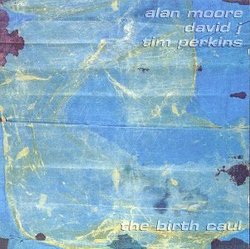| All Artists: Alan Moore, David J, Tim Perkins Title: Birth Caul (Shamanism of Childhood) Members Wishing: 2 Total Copies: 0 Label: Charrm Release Date: 3/5/1996 Genres: Alternative Rock, Pop, Rock Style: Goth & Industrial Number of Discs: 1 SwapaCD Credits: 1 UPCs: 017531608520, 798435222226 |
Search - Alan Moore, David J, Tim Perkins :: Birth Caul (Shamanism of Childhood)
 | Alan Moore, David J, Tim Perkins Birth Caul (Shamanism of Childhood) Genres: Alternative Rock, Pop, Rock
|
Larger Image |
CD Details |
CD ReviewsThis attempt is a mixed bag Jason Spiegel-grote | Brooklyn, NY | 11/04/1999 (4 out of 5 stars) "On November 18th, 1995, his forty-second birthday, Alan Moore performed a lengthy autobiographical poem entitled The Birth Caul. The work was accompanied by music from David J. and Tim Perkins. Last spring saw the release of a graphic version of the poem, illustrated by Eddie Campbell. The comic and the disc go together nicely, a kind of darkly mutated version of those comic-book-and-record sets that were ubiquitous in the 1970's. Moore refers to the work as "a shamanism of childhood." I'm wary of new-agey terminology, and would prefer to characterize the piece as an honest stab at High Art. While in the world of comics, he stands out merely by virtue of his having an imagination, Moore himself has said that he would be considered a hack if subjected to the critical standards of any other medium. This attempt is a mixed bag, but Moore's still more talented than he gives himself credit for. Fans will recognize the dark, brooding poetry of Watchmen and Swamp Thing and the hidden landscapes of From Hell, but when torn away from any mythical icons or comic-book-campiness, his influences are much more visible. His vivid imagery of a damp, bleak English landscape is reminiscent of T.S. Eliot, and his stream-of-consciousness wordplay reminds one of William Burroughs. Moore's poetry doesn't really come anywhere near Eliot's, but he's actually a much better writer than Burroughs. He is still, however, more the consummate comic writer than he is a poet or performance artist. The work is much more compelling and visual in the graphic novel than it is on the CD. This may have something to do with Campbell, but I think it's more likely that Moore is just used to working in a medium that's half visual. Also, when placed in a comic, especially a superhero comic, Moore's dark poetry is striking and insightful, but by itself it often gets melodramatic and adolescent. This is too bad, because Moore's come up with some of the best turns of phrase I've heard/read in a long time. His study of the storybook banality of working-class English life is compelling and often breathtaking-but can also be pretentious and humorless. The work itself contains a certain gallows wit, but when Moore reads it, it unfortunately gets lost. Still, the disc and the comic both are both worth having, and worth enjoying separately from one another (I particularly recommend listening to the CD in a darkened room). The music is brilliant at times, with an especially haunting soundscape that recurs during the "Birth Caul" segments."
|

 Track Listings (11) - Disc #1
Track Listings (11) - Disc #1